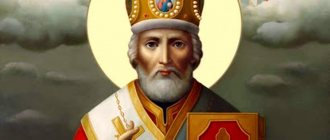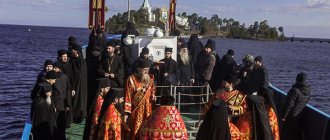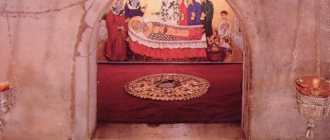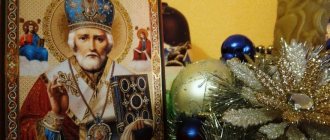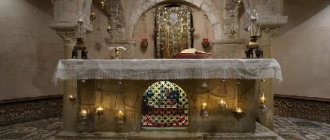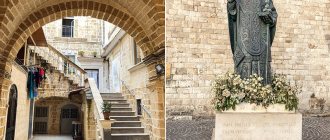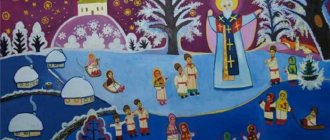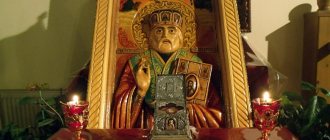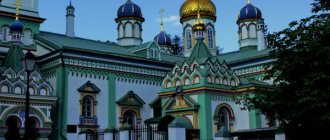December 19 is the Day of St. Nicholas the Pleasant, or St. Nicholas the Winter. About the history and traditions of the holiday - in the material of YSIA.
Nikola Winter falls at the end of December - the time when severe frosts begin and the mildest days of the year begin. Also in Rus', St. Nicholas has long been considered the patron of the suffering, the defender of the slandered, and they believed that he could help the innocently convicted. He is called the patron saint of sailors, merchants and children. Farmers also prayed to him - for good weather, for a good harvest. “The second intercessor after God,” this is what people said about Saint Nicholas.
Believers know that, among other things, Saint Nicholas helps in the search for love. According to legend, the saint once helped a poor father of three daughters, who could not marry them off because he did not have money for a dowry. A desperate man, in order to somehow feed his family, decided to sell the girls to a brothel. Having learned about this, Nikolai came to his house and gave him his own savings.
Perhaps that is why Saint Nicholas became the prototype of the good winter wizards - Santa Claus, Father Frost and others.
history of the holiday
December 19 is dedicated to Saint Nicholas, who became famous for his actions and selfless service to God. From early childhood he studied the Scriptures. In his young years he received clergy (title) and became a preacher. He used the wealth that he inherited from his wealthy parents for missionary work.
Many miracles are attributed to Nicholas. During his journey, he resurrected a mortally injured sailor and began to be considered the protector of travelers, merchants and children. One day Nikolai decided to secretly help three girls who did not have a dowry. He would quietly sneak into the house and leave a wallet filled with money.
On one of these visits, Nikolai threw coins into the chimney, but they did not burn, as they fell into the drying sock of one of the young ladies. This is how the legend of Santa Claus appeared. The date of the ascetic’s death began to be called the Day of St. Nicholas the Wonderworker.
During Soviet times, the holiday was forgotten. Customs were eradicated, and many of their adherents were subjected to ridicule and persecution. After the collapse of the USSR, the tradition was revived and began to gain popularity.
Who is Saint Nicholas?
The Life of St. Nicholas the Wonderworker says that he was born in Asia Minor, in the Greek colony of Lycia, in the third century into a rich Christian family. Since childhood, connected with the temple by true faith, he becomes a priest, having previously distributed his inherited property to those in need. Subsequently, priest Nicholas was ordained to the rank of archbishop in the city of Myra (in our time it is within Turkish Antalya). He became famous in this field as an irreconcilable fighter for the purity of the Christian faith in the fight against paganism and heresy that undermines its foundations.
Nicholas the Wonderworker earned great respect for his miracles of saving people and nations. Among the most famous: saving the inhabitants of Mir from a terrible famine and resurrecting a sailor during a strong storm.
Saint Nicholas passed away in peace to the Lord in old age. The body of the deceased saint immediately began to flow myrrh, and a large crowd of believers flocked to him for deliverance from illnesses and sorrows. Relics of St. Nicholas stayed in Myra for a long time (some of them are still there), where during his lifetime he served as archbishop, but in the 11th century they were transferred to the city of Bari, in Southern Italy.
According to legend, the saint himself, appearing to the priest of Bari, asked him about this: “God does not want my relics to remain in Myra, so transfer them to your city.” This is due to the Turks’ conquest of Myra Lycia and the likelihood of desecration of the relics of the Saint. Through risk and adventure, the Orthodox inhabitants of the city fulfilled the will of St. Nicholas with great joy.
Traditions and rituals of the holiday
On St. Nicholas Day, services are held in churches. Believers eat Lenten dishes, since the holiday falls during the Nativity Fast.
On the night of December 19, parents put gifts under the child’s pillow: fruits, sweets, toys. Single girls tell fortunes about their betrothed, make wishes, and pray to St. Nicholas for a happy marriage.
On this day, housewives bake special cookies - Nikolaychiki - for the festive dinner. On the tables there are also dumplings and pies with potatoes, mushrooms, cabbage, lean borscht, and pickles.
On this day, folk festivals are popular in villages. Young people enjoy sleigh rides. In some places, the ancient tradition of caroling on December 19 has been preserved. The guys go from house to house and sing ritual songs in which they wish the owners good health and a good harvest. For this they are given sweets and money.
On this day it is customary to do good deeds. People help those in need, distribute sweets, money, clothes, books, stationery to orphans and children from large families.
Matinees are held in kindergartens and educational institutions. Pupils read poems, demonstrate crafts, and perform song and dance numbers.
With St. Nicholas Day, preparations for the New Year and Christmas begin. People are putting things in order at home, buying groceries, choosing gifts for loved ones and friends.
Why is St. Nicholas confused with Santa Claus?
Beloved in the West, Santa Claus is a folklore character who secretly puts gifts in the socks or shoes of obedient children on Christmas Eve. What is in it from the Holy Wonderworker? Most likely, this is the story of those secret miraculous gifts with which the saint saved his neighbors...
Saint Nicholas loved to give alms. But, fearing human glory, he did it secretly. A poor unfortunate man wakes up in the morning, and a bag of money is waiting for him on the floor. In the same way, being a priest, the saint saved him from poverty and shame by secretly giving “three bundles of gold” to a father and his three daughters, whom he, thanks to this gift, was able to piously marry.
Along with such saints as the Prophet Elijah, the apostles Peter and Paul and other great Orthodox saints, Nicholas the Wonderworker is surrounded by bright tales and legends. But his main traits are kindness and protection.
Signs and beliefs
- On December 19 it snows - for the wheat harvest, rain - for the harvest of cabbage and cucumbers.
- If the weather is cold on St. Nicholas Day, then the whole winter will be cold, and if it is warm, then the winter will be clear and without severe frosts.
- If you make a wish on this day, St. Nicholas will help make it come true.
- On St. Nicholas Day you can’t do anything for yourself, but only for those in need.
- If all debts are not paid off by December 19, then next year you will have to live in poverty.
St. Nicholas Day is a bright winter holiday. According to popular belief, on the night of December 19, Nicholas the Wonderworker descends from heaven to earth and helps everyone in need.
When is St. Nicholas the Wonderworker Memorial Day celebrated in 2022?
There are several days of memory of St. Nicholas the Wonderworker in the Orthodox church tradition. On August 11, believers remember the birth of the saint, and on December 19 (new style, old December 6) - his death.
There is also a memorable date for the transfer of the relics of the wonderworker from Myra Lycia to Bari on May 22. These three holidays also had popular names - respectively, Nikola Autumn, Nikola Winter and Nikola Veshny (Summer). In addition, Nicholas in Rus' was called the Ugodnik (the same as the Wonderworker).
What not to do on the day of St. Nicholas the Pleasant
- No one was allowed to be sad about Nikola - it was believed that this would bring severe frosts. People paid attention to how Nikola continues the work of Saints Barbara and Sava - “Nicholas will nail down what Sava will pave” - freezes rivers and lakes.
- Break the Nativity fast. Despite the holiday, you should not break the rules of fasting. Fish is allowed, but other animal products are still prohibited.
- Lend. On this day you should not give money even to your closest people. Previously, in Rus' they believed that along with money you could take good luck and luck out of your home.
- You cannot do household chores - build, craft, sew, embroider and even wash, otherwise you can cause a lot of troubles.
- According to folk traditions, on this day you cannot scold or scold children, otherwise Saint Nicholas will become angry and punish you.
- You cannot swear or use foul language, as all negative energy will return threefold.
Miracles of the Saint
Nicholas the Wonderworker helped reduce exorbitant taxes. In 324, the construction of a new Christian capital, Constantinople, began, which required enormous material resources. Census workers were sent to all cities to establish tax collections. The official who made the inventory in Myra drew up an unfair report in favor of the treasury. After this, a tax collector came to Lycia, and he realized that it would be difficult to collect the required amount, but the royal decree had to be carried out. Threats and humiliations were used, Lycia was doomed to ruin. Desperate residents came to their bishop and asked him to write a letter to Emperor Constantine about their misfortune, after which Saint Nicholas went to Constantinople.
When the holy bishop stopped at the Church of the Most Holy Theotokos, local bishops came to him and fell at his feet, asking for blessings. During their joint Divine Liturgy, everyone saw a fiery flame come out of the mouth of St. Nicholas the Wonderworker. On the morning of the next day after the Liturgy, the venerable servant of Christ appeared before the king and convinced him to significantly reduce taxes.
Nicholas understood that the decree needed to be urgently delivered to Lycia and announced to the people, then the emperor would not be able to cancel it. Nicholas placed all his hope in God - he sealed the letter in a hollow reed tube, lowered the document into the sea and prayed. At night, in a vision, the angelic Nicholas appeared to one of the priests of the city of Myra and ordered them to take the reed pipe, which they should find in the Andriak harbor. The certificate had to be shown to the royal official without delay and announced to the people. The priest did everything exactly.
During this time, the courtiers were able to sway the royal opinion, and the king decided to change taxes. He asked Saint Nicholas to give the letter back so that changes could be made to it. However, Nicholas said that the decree was already in Lycia and was announced a few days ago. Since it was impossible to deliver the decree so quickly, he sent messengers to check the authenticity and time of the announcement of the decree. After confirming Nicholas’s words, the tsar became convinced that the tax assessment was unfair and released Nicholas the Wonderworker with gifts. The charter, which saved the people of Lycia from exorbitant taxes, was kept in the cathedral sacristy for several centuries, as a memory of one of the miracles of St. Nicholas.
What holiday is today? February 17, 2022
February 17, according to the Orthodox calendar, is the day of remembrance of St. Nicholas the Confessor, abbot of Studite. People called this day “Nikolai Studenit”. In Rus', the monk was called Nikolai Studeny, since this holiday almost never happened without the icy February frosts.
From childhood, Nikolai studied at a monastery school, after which he was tonsured a monk, and soon became a priest.
During the imperial persecution of Christians, the monk was subjected to cruel torture and imprisonment many times, but remained faithful to the Christian faith, continuing to spread Orthodoxy among the pagans. For his faith, Nikolai received the gift of healing from the Lord.
Who is Nicholas the Wonderworker
Nicholas came from a wealthy Greek family, but his parents died early and the boy barely had time to reach adulthood before he became the sole heir to a decent fortune. It would seem that life itself is pushing him towards a carefree and comfortable existence, but Nikolai did not need this. Using his parents' money, he began to secretly help those in need.
There was such a case: a famous merchant went bankrupt, and his daughter’s engagement was on the verge of failure: the groom’s family rebelled against the lack of a dowry. And the father came up with the idea of selling his daughters’ virginity so that they would have money for a dowry. Nikolai found out about this through a revelation shown to him in a dream - and at night he threw a bag of gold through the girl’s window. And he did this for each daughter. The third time, the father tracked down Nikolai and threw himself at his feet with gratitude.
The city learned about Nicholas's deeds and, for his kindness, elevated him to the rank of bishop. Since then, he has been a recognized saint who gives gifts, both to Catholics and Orthodox Christians.
However, Nikolai was not only a “kind grandfather”. There are rumors that it was he who slapped the heresiarch Arius, who believed that Christ was not God, but only God’s creation.
What did children used to find under their pillows on St. Nicholas Day?
In Rus', gifts from St. Nicholas were placed under children's pillows. These were simple treats and sweets - apples, nuts, cookies, gingerbread, candy. Traditionally, in honor of the holiday, housewives baked St. Nicholas gingerbread , which the kids dreamed of finding under their pillow! But Nicholas the Wonderworker brought his treats only to obedient children.
According to legend, he quietly watched the child throughout the year and wrote down all his good and bad deeds in a magic book. There is a belief that on the night of December 18-19, the Wonderworker comes to every child’s house , accompanied by two angels and two devils. They tell the saint what good and bad the child has done over the past year. If the baby’s behavior leaves much to be desired, the Saint puts a twig under his pillow. This is a signal that it is time for the child to improve.
History of the celebration
The holiday in the name of God's saint is celebrated by Orthodox believers twice a year: in winter and spring. Both dates are associated with an interesting legend. One day, a peasant was returning home when suddenly his cart got stuck tightly on a washed out road. Without outside help, the man could not cope with the loaded cart, and therefore asked for help from the saints who passed by, marching to meet the Lord. Kasyan, the first to notice the poor fellow, just waved it off, not wanting to get dirty. But Nikolai was not afraid of the dirt and helped pull out the cart.
Appearing to the Almighty, the Wonderworker was met by the Almighty asking why he was late and what happened to his clothes. The saint spoke in detail about what had happened, after which God turned to Kasyan for clarification. He replied that he did not want to keep the Creator waiting, and besides, his robes would be covered in dirt. Then the Lord decided: to celebrate Kasyan’s holiday once every 4 years, and Nicholas’s holiday twice a year.
Church Orthodox holidays February 17
Today, February 17, the church also honors Orthodox saints, this is a day of remembrance:
Venerable Isidore of Pelusiot
The parents of Isidore, born in Alexandria in 360, belonged to a noble family and were relatives of the Archbishop of Alexandria Theophilus. Young Isidore received the highest spiritual education of his time, after which he decided to visit Mount Pelusiot, where he became a revered monk. He did not refuse anyone the interpretation of the most difficult moments of Holy Scripture, left over 2 thousand messages, and was versed in the mysteries of the Incarnation of the Lord God. Thanks to his knowledge, he actively participated in the defense of the true teaching from the attacks of the heretic Nestorius. One of his merits is the meeting of the Third Ecumenical Council.
Righteous Kirill of Novoezersk
Kirill was born in Galich, his parents were pious people. From an early age he showed a desire for solitude, was fond of reading spiritual literature and became involved in church services. This forced him to leave his parents' home and secretly take monastic vows. When Kirill's father left for another world, he decided to share all his property with the poor, and he himself began wandering in search of a secluded place. And only 20 years later he settled on a small island in the middle of Lake Novy, where he built a cell for himself, and then for the brethren. Later he managed to erect two temples, the Resurrection of Christ and the Mother of God Hodegetria. He did all this alone, cutting down trees, clearing them, building, plowing the land and growing crops. He died in the rank of abbot in 1532. He became famous for the healings and other miracles that occurred in the built churches even after his death.
Prince George of Vladimir
On February 17, it is customary to honor the memory of Prince George of Vladimir, the son of Grand Duke Vsevolod, who was popularly nicknamed the Big Nest. Prince George was killed in 1238 during a battle with the Tatars. In 1645, representatives of the clergy canonized the prince for his military exploits.
